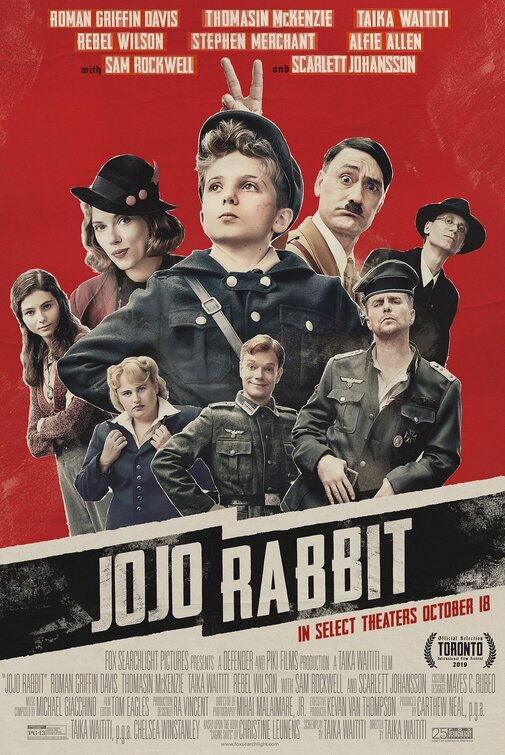By Samuel R. Staley
Some critics dismissed the Oscar-nominated dark comedy Jojo Rabbit for making light of the evil embedded in Nazi Germany when the movie was released in October 2019. Hitler and National Socialism were, after all, existential threats to freedom and liberty throughout Europe, much of North Africa, and the Middle East until they were finally vanquished in May 1945. But New Zealand director Taiki Waititi’s (Hunt for the Wilderpeople, What We Do in the Shadows, Thor: Ragnarok) irreverent parody of one of the most perilous times in modern world history is worthy of its six Academy Award nominations, including those for Best Picture, Best Adapted Screenplay, and Best Supporting Actress.
Indeed, comedian and satirist Waititi should be credited for his faith in his audience’s ability to understand the deeper humanism that anchors the story. Waititi has, largely successfully, provided a different window from which to view the brutality of National Socialism. Rather than take an adult perspective, he uses the lens of a young boy, Johannes “Jojo” Betzler (Roman Griffin Davis).

Jojo is struggling to find his own heroic self in a dystopian time. All he has known is totalitarianism, racism, and state myth-making. At just 10 years old, he has been completely taken in by the myth-creating propaganda of the Nazi regime. Jojo fantasizes about being the model German citizen and warrior. Jojo even has an imaginary friend in the persona of Adolph Hitler (played by Taika Waititi) who encourages and coaches him along. Jojo’s single mother Rosie (Scarlett Johansson, Marriage Story, Iron Man 2, Lucy) let’s him indulge in his heroic aspirations. Although she knows the brutality of National Socialism, she also realizes that their lives would be in jeopardy if anyone suspected anti-Nazi sympathies.
When an accident at his Hitler Youth camp leaves Jojo maimed and disabled, he is forced to forego further training as a soldier and do the bidding of the German army officer in charge of his town, Captain Klenzendorf (Sam Rockwell, Richard Jewell, Three Billboards Outside Ebbing, Missouri, Vice). Dismayed but undaunted, he continues to commit himself to the cause. When Jojo discovers Elsa (Thomasin McKenzie, Leave No Trace), a Jewish girl hiding in his home, his worldview and his fantasies must confront sobering realities.
Importantly, Jojo’s imaginary Hitler is no goose-stepping dictator who projects his authority through the cool precision and determined leadership depicted in Nazi propaganda films. Rather, Jojo’s Hitler mirrors what he imagines his own father would be if he were at home with his loving mother rather than fighting in the war: understanding, supportive, and encouraging.
As Jojo experiences more life, confronts the challenges to his worldview created by Elsa, and bears witness to Nazi brutality, he must also confront Hitler and Nazi ideology if he wants to break free and become the man he aspires to be. Indeed, the changing nature of Jojo’s relationship with Hitler (and by extension Nazism) is a central part of the story. To miss this evolution is to miss the heart and soul of the movie.
Jojo Rabbit authentically attempts to grapple with the horror of totalitarianism by combining comedy with a coming of age story. Jojo Rabbit earns its place at the Oscar table. While it faces stiff competition from other excellent films released in 2019—most notably Parasite, The Irishman, Joker, and 1917 – Waitiki’s parody holds its own because the story is anchored in a universal humanism that ultimately undermines Nazism and similar authoritarian regimes.
- Best Picture
- Best Adapted Screenplay
- Best Supporting Actress (Scarlett Johansson)
- Costume Design
- Film Editing
- Production Design
Samuel R. Staley is a Research Fellow at the Independent Institute and Managing Director of the DeVoe L. Moore Center in the College of Social Sciences at Florida State University. The above originally appeared at the Independent Institute.

You cant be more wrong. This was a hackneyed attempt at putting a childs face on the events of the German downfall and make light of the boys misguided loyalty that was either driven by his clueless comprehension of the situation or his blind crush on a Jewish girl at his mercy. At best its deplorable and insulting like much of directors films.
ReplyDeleteOnly Joker was a bigger steaming pile of crap than this mess!